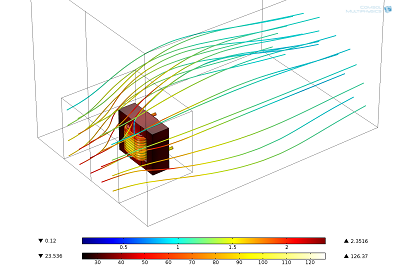Cluster & Cloud Computing Blog Posts

Modeling Convective Cooling of Electrical Devices
We developed a model that includes all of the important details of thermal management in a high-power electrical device. To do so, we needed to use high performance computing with hybrid modeling.

Building a Beowulf Cluster for Faster Multiphysics Simulations
In 1994, NASA researchers built a small cluster of normal workstations. They called this parallel workstation Beowulf. Today, “Beowulf cluster” describes clusters built from normal workstations.

Automate Your Modeling Tasks with the COMSOL API for use with Java®
You can automate your coffee-making process, so why shouldn’t you be able to automate your modeling tasks? You can, using the COMSOL API for use with Java®.

Added Value of Task Parallelism in Batch Sweeps
You can use batch sweeps to improve your modeling performance when you reach limitations in parallel computing. Learn how in this part of our Hybrid Modeling blog series.

Hybrid Computing: Advantages of Shared and Distributed Memory Combined
Shared memory platform + distributed memory platform = hybrid computing. Learn about the various aspects of hybrid computing and modeling in this installment of our blog series.

Intro to the What, Why, and How of Distributed Memory Computing
In a follow-up to our post on shared memory computing, we discuss another building block of hybrid parallel computing: distributed memory computing.

Intro to the What, Why, and How of Shared Memory Computing
A couple of weeks ago, we published the first blog post in a Hybrid Modeling series, about hybrid parallel computing and how it helps COMSOL Multiphysics model faster. Today, we are going to briefly discuss one of the building blocks that make up the hybrid version, namely shared memory computing. Before that, we need to consider what it means that an “application is running in parallel”. You will also learn when and how to use shared memory with COMSOL.

Hybrid Parallel Computing Speeds Up Physics Simulations
Remember 20 years ago, when the TOP500 list was dominated by vector processing supercomputers equipped with up to a thousand processing units? Let’s take a walk through history to the future.
